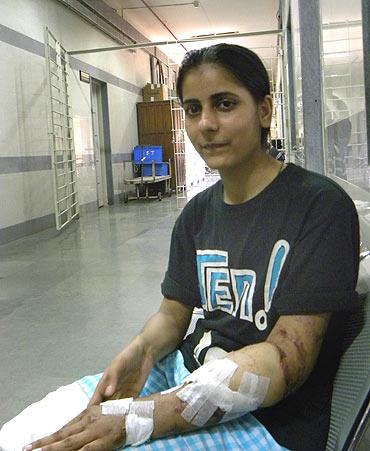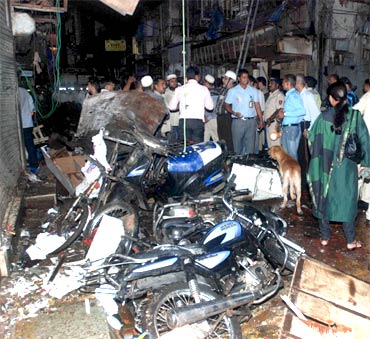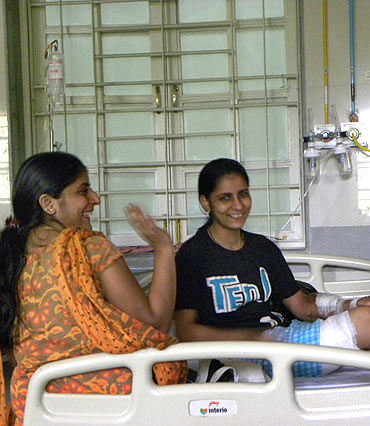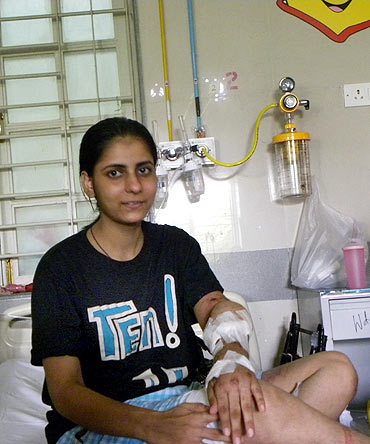
On July 13, Varsha Karia was injured in the bomb blast at Dadar Kabutarkhana. Since that evening, the King Edward Memorial Hospital has been her home.
One month and 25 days later, she was finally discharged. Rediff.com's Abhishek Mande spent the last few hours at the hospital with her and her sisters.
Everyone remembers that day. There was a blast and everyone ran helter-skelter. Some said it sounded like a gas cylinder explosion; others said it sounded like a bomb should -- loud and deafening.
Varsha Karia remembers it differently.
On July 13, she was bargaining with a local vendor in the Dadar market for breadfruit. Her sister had promised to cook it for her when she returned home.
She was tempted to buy it -- it isn't very easily found in Mumbai -- but gave up on the idea because the vendor was overcharging her.
So like every dutiful citizen, Varsha, 26, crossed the road and along with Blossom, a lady she had befriended on the local train, and started walking on the pavement and headed home.
She crossed the main gate of the Dr Antonio da Silva School and was walking past the bus stop when for some inexplicable reason looked skywards.
The space between the bus stop and a streetlight nearby was suddenly filled with bright sparks. At almost the same time, she heard a sound she could not exactly place. It wasn't very loud -- just a 'phut', a muffled explosive sound.
Then again, it could have just been her ears in which rang that soft but shrill and incessant wheezing that was followed by a few moments of absolute incoherence.
Varsha Karia didn't fall down. She just stood there, unsure of just what had happened.
Then she looked at her left hand, which was now bleeding profusely -- about five inches of flesh had been torn away. There was no pain.
Like the rest of her, Varsha's hand had gone numb.
Seconds later, she recovered -- the hand would take much longer -- and saw an unknown man lunging towards her.
On another day, she would've stuck the umbrella at him, but today she let him hold her. With some difficulty, she removed her bag from her right shoulder, gave him the umbrella and asked him to call two people -- her cousin Narendra and her elder sister Neha.
She wasn't sure she would see her bag, her wallet with all her credit cards and cash or for that matter the umbrella.
The next thing she remembers is being made to lie down on a bright blue tarpaulin -- ones that sell like hotcakes in Mumbai's monsoon -- lifted and being put in the back of a police van.
As she stared at the van's roof, Varsha held on to a door handle to avoid falling off the seat. She could hear the two policemen speaking on the wireless transmitter system ordering their colleagues to clear the roads and begged them to drive faster.
Finally, the car took a sharp left, a quick right and stopped.
Doctors, nurses and ward boys were prepared. They lifted her, placed her on the hospital stretcher and wheeled her in.

One month and 25 days after she was driven into the King Edward Memorial, KEM, Hospital, Varsha Karia can laugh over it.
At that time though, she was just so frustrated, she asked the doctors to cut off her hand and let her go home.
Varsha admits it was plain silly to even think of it, let alone suggest it to the doctors.
"What would you have done if they had really cut it off?" I ask.
"I don't know really," she laughs.
Varsha loves to laugh just as much as she loves to talk. Dressed in a pair of shorts and a t-shirt -- it's the first time in months that she has been permitted to wear a tee -- the 26-year-old is the life of ward number 16 for women and children in the plastic surgery department at the hospital.
Much unlike the rest of the patients, Varsha and her sister Jigna are almost always smiling and laughing. The oldest of the three, Neha is exceptionally grim. She rarely smiles or talks.
"That's how she always is. She doesn't talk a lot or smile. She's a teacher," Jigna tells me giggling.
Neha is 30 and was married in May. She runs a private tuition class from her three-room maternal home near the famous Siddhivinayak temple.
Jigna works for a textile company in Lower Parel a few kms away. She was at work when she got the call.
"All I was told was that Varsha had an accident. I packed up my things and went to inform my boss. When I returned to pick my bag, I saw the news on television."
Varsha works for Amsal Chemicals in south Mumbai. Had she reached home that evening, chances are she would have taken over from Neha as she always did.
Instead Varsha ended up at the hospital.

Despite being extraordinary people in extraordinary circumstances, the three sisters, with whom I spent much of Varsha's last day at the hospital, showed grace and warmth.
Like most Gujarati families I have known, they had a bagful of goodies with them and insisted that I have "at least one khakra."
Neha, the grim oldest one, came across to me as being the pillar of the family while Varsha, the youngest one was quite clearly the pampered one.
It was in Jigna that I could see a bit of both the sisters -- the fun-loving Varsha and the responsible Neha.
Unsurprisingly, she was also the voice of the family. She would accompany Neha when there was some talking to be done with the doctors or the authorities.
When it came to talking to the press however, Jigna would step back and let Varsha speak.
I ask Varsha how life has changed after the blasts. She simply says it has, but confesses she can't put a finger on how. "It's too early," she tells me, "For now I just want to go home."
Since the time Varsha was admitted to the hospital, her damaged hand has gone through at least two surgeries.
The first occurred on the night of the blasts itself -- it started at around 9 pm and went on till past 4 am.
Initially, the doctors were apprehensive about being able to save her hand but when they asked Varsha to move her fingers, they realised that she hadn't lost all sensation.
Although she couldn't move them, she could feel the doctors touching her fingers even as they made sure she wasn't losing consciousness.
Soon after the surgery, where they removed the shrapnel and inserted rods in her hand, the doctors moved her to the Intensive Care Unit, ICU.
Later, the State Bank of India let her use the exclusive rooms meant for their staff.
As days passed, the wound began to heal. Much care had to be taken to ensure the almost five-inch large patch of skin and flesh that had been ripped off her body didn't catch infection.
Finally on the evening of August 16, she was told that her wound was ready to be 'patched'. The wound was opened and she was asked to wash it with water.
Varsha recalls, "I touched that part of my hand for the first time that day. It was a strange feeling. I had seen it, of course, whenever the bandage was opened up, but it felt very strange touching it myself. It was like I was touching someone else's hand."
The next morning a huge patch of skin and flesh was cut from her right thigh and patched over her hand.
When I met her on Thursday, September 8, the wounds are in the process of being healed. There is a huge patch, which stands out like a bump and is of a fairer complexion than the rest of her hand.
She is able to walk perfectly well though not as fast as she would earlier. We walked down two stories and up again and you could see there were no signs of discomfort.
There is a thick bandage around her thigh, which prohibits her from wearing anything very long like the salwar kameez that her sisters are wearing now.
I ask her if she isn't conscious wearing a pair of shorts to which she hesitates but says she isn't.
"What really made me conscious though was the gown they would make me wear. It was open from one side. That one did make me very conscious," she says.

She remembers Shiv Sena leader Uddhav Thackeray visiting her, but doesn't know what he said to her.
Jigna tells me that he had promised to come visit her again after she got well. He hasn't called since.
Then there were scores of politicians who would hand the family their visiting cards and pay lip services.
Some enterprising persons decided to spread the rumour that Varsha was without any family at the hospital. The text message went viral within hours and the Karias were flooded with telephone calls.
Others, making the most of the message pretended to be her guardians and sought financial help.
"We didn't need any," Varsha says, "The hospital has taken good care of us. We really could not have asked for more."
Jigna seconds it. She says that never once were they made to run for the medicines they needed -- and they needed a lot of medicines -- neither were they charged.
On the evening that she was admitted, Dr Sanjay Oak, the hospital dean, had rolled up his sleeves. There were occasions, Jigna tells me, when Dr Oak would get the medicines himself. He had also granted them all the necessary permissions so they never ran short of medicines.
"All we were told to do is to fill up a form and submit it to the hospital's social service cell," she says.
Much to their surprise, the compensation that the state and centre had announced came rather promptly too. Jigna recollects a government officer handing them out Rs 200,000 in three instalments.
"We didn't have to do anything," she says sounding genuinely relieved.

Neha would start her tuition classes in the evenings. When Varsha returned home, she would teach mathematics to students of Class 10.
Later, they would have dinner together and then go for a walk to Shivaji Park.
On Saturdays, the sisters would go shopping for the week's grocery and Sundays would be spent with the family at home or away taking a break from the routine.
Surely, life for the Karias has changed in ways they could have never imagined.
Neha spends most of her afternoons in the hospital.
Jigna has not seen her home for over a month now -- she goes to work from the hospital every morning and returns each evening to the hospital itself.
As for Varsha, she would sit around, read the newspapers, chat with people around her or just sleep it out. Sometimes she would get so terribly bored, she would try to convince her doctors to let her go home.
Today, their bags are packed. They have been told that Varsha can finally go home. The dean is keen on meeting her before she leaves.
I am not permitted inside the dean's office, but I see Dr Oak and Varsha exchange smiles and pleasantries.
In a sense it is a closure for Dr Oak himself. He was there when Varsha was wheeled in. He wants to make sure he is there when she walks out too.
When I ask her what she plans to do now, Varsha says she'll return to her accounting job in January.
No, but what do you want to be, I prod again.
"I just want to concentrate on my job," she says simply.
What did you want to be as a child? I ask.
Varsha's eyes light up and pat comes the reply, "I wanted to be a doctor!"
Jigna walks up to us. It is time to go.
In her excitement, for a moment Varsha forgets to bid everyone goodbye.
As we walk down the corridor of the hospital and its various odours, Varsha's smile grows wider as does her pace.
"This is the first time I will step out in the sun," she says just before she steps outside the corridor.
Varsha Karia then looks skywards, just as she may have done one month and 25 days ago on that fateful evening.
Only this time, there are no sparks, no shrapnel. The sun is shining brightly upon her.